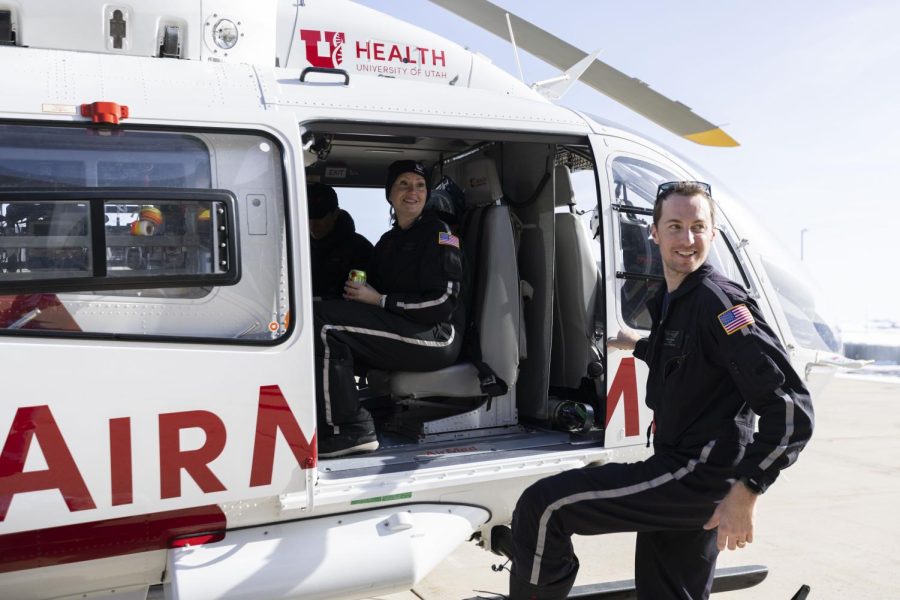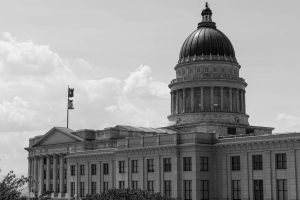Mendenhall: Support First Responders and Their Families’ Mental Health
Flight Nurse Ashley Palmer and Pilot Kevin Horn take a break from cleaning up to have a snack and talk in Park City, Utah, Feb. 4, 2023. (Photo by Sarah Karr | The Daily Utah Chronicle)
February 11, 2023
In Feb. 2022, H.B. 23 was passed, requiring that first responders have access to mental health resources due to the high-stress nature of their jobs. This legislative session, H.B. 59 proposes that the spouses and children of retired first responders be added to the plan that entitles them to state-provided mental health services. When an estimated 30% of first responders develop mental health concerns, it makes sense that their families could be affected by the residual trauma. Thus, mental health resources are absolutely crucial for first responders and their families.
Bill Sponsors
The primary bill sponsor for both H.B. 23 and 59 is Rep. Ryan Wilcox. Wilcox states he is an advocate for law enforcement and first responder legislative issues. Wilcox’s website says, “Working in health care has given him a front-row seat to the everyday heroism exemplified by our police, fire, dispatchers, search and rescue teams, and front line caregivers.” Wilcox, who presides over House District 7, also said he has an emphasis on enjoying a work-life balance with his family.
In August 2022, on a national level, a bipartisan group of senators led by Sen. Chuck Grassley introduced the Fighting Post-Traumatic Stress Disorder Act. This bill has many similarities to Utah’s own H.B. 59, in which programs are being created to give first responders struggling with mental health issues the preventative care that they need. Sen. Chris Coons, a cosponsor of the bill, previously stated, “I know how important it is to give the men and women who keep us safe the resources they need, especially those who have been scarred by their sacrifices.”
Breakdown of the Bill
The first responders specifically addressed in this bill consist of a law enforcement officer, EMT, AEMT, paramedic, firefighter (including wildland), dispatcher, correctional officer, search and rescue worker, victim advocate and/or CSI tech. Through the bill, first responder agencies would be required to submit a plan of action to best provide “timely and effective provision of mental health resources to first responders.” According to H.B. 23, this could look like mental health assessments, outpatient treatment, peer support services or mental health therapy/counseling.
Departments then can award grants to specific agencies if the contingencies of their plan are thorough enough in cost and viability. This means that agencies will only receive grant-funded money from the Department of Public Safety once they have pieced together a plan for their current and retired first responders. The only issue I have with this bill is that agencies have to create their own mental health plans. I think DPS should create some kind of framework or example for agencies to start with. I think this would help not only with uniformity, but also standard of care.
Praise for H.B. 59
I am overjoyed that H.B. 59 would add a family amendment to H.B. 23. Although I’m not a child of a first responder, I do have close friends and family who work in the field. I’ve seen some of the lasting effects that their families have endured. Mental health is a very important priority to factor into high-stress jobs. Our front-line heroes need saving, no matter what that looks like. Some of the stressors first responders are frequently exposed to are death, grief and injury. Taking those stressors into consideration, the CDC published a study that stated, “First responders may be at elevated risk for suicide because of the environments in which they work, their culture, and stress, both occupational and personal.”
In 2020, the Senate and House approved enough funding for the Helping Emergency Responders Overcome Act. This act allows for the collection of data that may fill the gaps in information regarding death and suicide cases of first responders. Combined with the information supplied from the National Violent Death Reporting System, the Public Safety Officer Suicide Reporting System was created. This system hopes to provide long-lasting support and answers when evaluating first responders’ mental states.
I’m happy that these programs are being created. According to Psychiatric Times, “most EMS personnel are reluctant to seek care due to fears of stigma, irrational codes of silence, and fear of possible disciplinary action such as being put on leave or desk duty indefinitely.” This makes it all the more pressing to address the mental health stigma around first responders in general. Allowing first responders and their families the resources that they are rightfully entitled to is the first step in that community to begin the destigmatization.
As great as an amendment that H.B. 59 is to H.B. 23, we are long overdue for spouses and children to be considered when talking about proposed mental health treatment plans. Passing this bill would continue to show solidarity both for the progression of mental health and the support and safety of first responders. The sooner we see these changes enacted, the better our lawmakers can provide for us as citizens.

















